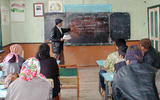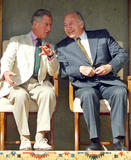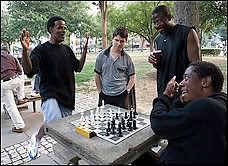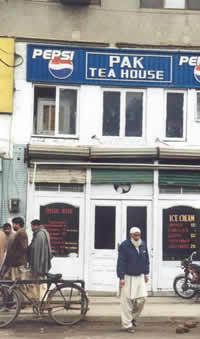Raja Paurava and Alexander — Salman Rashid
FOOTLOOSE: On Raja Paurava and Alexander — Salman Rashid
 We do not celebrate Paurava; we name no roads after him and do not teach our children of his lofty character because he shines in our pre-Islamic darkness. But can we today name even one leader possessed of just a shadow of the integrity and character shown by Raja Paurava?
We do not celebrate Paurava; we name no roads after him and do not teach our children of his lofty character because he shines in our pre-Islamic darkness. But can we today name even one leader possessed of just a shadow of the integrity and character shown by Raja Paurava?
I lament that we in Pakistan, those of us whose ancestors converted to Islam, insist on denying our pre-conversion history. For us, it simply does not exist. We invent tales of imaginary ancestors having arrived in the subcontinent duly converted to the ‘one and only true faith’ from some place in Iran or Central Asia. Pride of place of course goes to all those who subscribe to the yarn of their ancestors’ heroic overland trek direct from Mecca. I know of families who possess genealogical charts connecting them to prophets of yore and, in one case, even to Adam himself!
Consequently, everything that transpired in this great and wonderful land of the Sindhu River before the arrival of these august (albeit imaginary) personalities was Kafir. To be proud of it is criminal; to acknowledge it negligent of religious duty. Not surprising then that some of us even have a problem mentioning Moen jo Daro and Harappa.
Since all our imaginary Islamic ancestors came from the west, we somehow got it into our heads that all those who came from that direction were also necessarily Muslims. An ‘historian’ at Taxila once told me that Alexander the Macedonian was one of Islam’s greatest heroes. Similarly, on a visit to the village of Mong (Mandi Bahauddin) many years ago, a man floored me by not only commending Alexander as a personality of the Scripture but also for reviling Paurava (Porus in Greek) as a Hindu. But history remembers Raja Paurava as a man of rare character.
The Battle of the Hydaspes (Jhelum River) was fought in the year 326 BCE on a beautiful morning in late May after a night of torrential rain. The crystalline blue sky would have been piled up with cumulus when Paurava’s Punjabis advanced to meet their foe the Macedonian, Greek, Scythian, Persian and even a brigade of Punjabi troops from Taxila. From even before day broke, it was a hard fought contest. And before the sun had started to wester, the Punjabis were in disarray. The battle had been lost.
Arrian, the Greek historian, writing four hundred years after this epic battle pays tribute to Raja Paurava thus — and there can be no greater tribute for it comes from a foreigner: ‘Throughout the action Porus proved himself a man indeed, not only as a commander but as a solider of the truest courage...his behaviour was very different from that of the Persian King Darius: unlike Darius, he did not lead the scramble to save his own skin ... [but] fought bravely on.’
With all his units dispersed, Paurava, himself grievously wounded in the right shoulder, eventually submitted to an old philosopher friend of his and permitted himself to be led into Alexander’s presence. Arrian recalls that encounter: ‘[Alexander] looked at his adversary with admiration: he was a magnificent figure of a man, five cubits high and of great personal beauty.’ The cubit being variable in various parts of Greece, this figure would yet mean that Paurava was no less than seven feet tall! And Alexander of middling stature would have had to look up into those dark eyes and the sweat-streaked face.
It was then that the famous exchange took place that even the most ignorant among us know of. What, asked Alexander, would Paurava wish that the conqueror do with him and Paurava replied that he wished to be treated as a king. This much we all know. But Alexander had a farther query. ‘For my part your request shall be granted. But is there not something you would wish for yourself? Ask it.’ And Paurava the Punjabi who we are ashamed to claim as our own said that everything was contained in this one request.
Peace was made between the victor and the vanquished and it has been said that this was one battle where both sides emerged victorious. Alexander returned Paurava’s kingdom to him and shortly after the death of the king of Taxila asked Paurava to look after the affairs of that kingdom as well. Just three years after this great battle on the Jhelum, Alexander died under mysterious circumstances in Babylon. That was June 323 BCE. Within years, the great Raja Paurava was assassinated and the story seems to have ended. But not quite.
In 44 CE, Taxila was visited by a Greek philosopher named Apollonius. The philosopher’s account (kept by his diarist) tells us of two temples, one outside the city walls and the other by the main street leading to the king’s palace. Both temples had large copper plate murals adorning their walls. The murals depicted scenes of battle from the struggle that had taken place on the banks of the Jhelum River three hundred and sixty-seven years earlier.
The account marvels at the finesse of the renditions: the colours and the forms were as though one were watching a real scene frozen in time. The murals in both the temples depicted Raja Paurava in defeat. The account goes on to tell us that these murals were commissioned by Raja Paurava when news of the death of Alexander arrived in Taxila. Consider: Alexander was dead in distant Babylon, his Greek garrisons in the Sindhu Valley had deserted and Paurava was now the unquestioned master of this country. As sole sovereign, he could have ordered the murals to turn history around and depict him in glorious victory and Alexander in abject and shameful defeat.
But the Punjabi king was not just great in physical stature; he possessed also a soaring spirit and largesse of the heart that few of us know. The king ordered the murals, so it is recorded by Apollonius’ diarist, in order not only to acknowledge his friendship with Alexander, but also to preserve history as it had actually unfolded. In his wisdom the king knew that the creative passage of time was bound to alter history.
When the murals were put up, Taxila was what we today know as the Bhir mound. Two hundred years later, the Indo-Greeks shifted it to the remains we today call Sirkap. It is evident that the murals were admired to be moved to the new city. In the subsequent two hundred odd years the city was rebuilt several times as the various cultural layers show. Each time the murals were safely removed to a new site or they would not have survived three and a half centuries. Finally, in 25 CE Taxila was levelled by a severe earthquake. And when nineteen years later Apollonius arrived, the city was being rebuilt under a Parthian king and the murals had faithfully been reinstalled at the brand new temples. History was not permitted to be tainted.
We do not celebrate Paurava; we name no roads after him and do not teach our children of his lofty character because he shines in our pre-Islamic darkness. But can we today name even one leader possessed of just a shadow of the integrity and character shown by Raja Paurava?
Salman Rashid is a travel writer and knows Pakistan like the back of his hand











